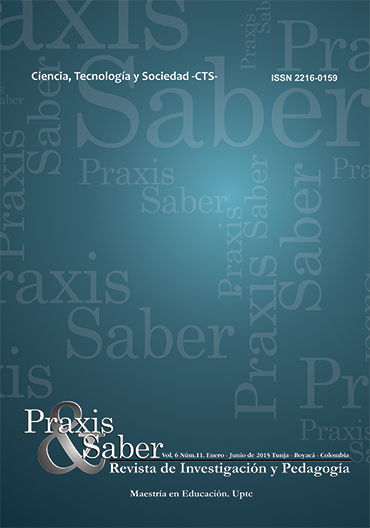The impac t of a scientific issue aproac h on the scientific and technological literac y of youth and adults

Abstract
The processes of the scientific and technological literacy (STL) developed with communities of youth and adults do not usually emerge beyond the classroom, these are simply compulsory for obtaining a degree. In such a context, this paper presents the results of a research whose purpose was to analyze the impact of the discussion about controversial aspects of a socioscientific issue (SCI) on the SLT process of a group of youth and adults who studied a secondary school program by cycles in the town of Chia, Cundinamarca (Colombia). Some SCI-based activities related to the pollution caused by the industrial action in the Rio Frio sub-basin river (Cundinamarca, Colombia) were designed and implemented for the analysis. It was found that working with SCI in literacy processes allows the formation of a critical and participatory subject, thus encouraging the learning of science concepts and their relationship with social and technological implications.Keywords
science education, citizenship education, CTSA, critical qualitative research
References
- BLANCO, A. (2004). ‘Relaciones entre la Educación Científica y la Divulgación de la Ciencia’. Revista Eureka sobre Enseñanza y Divulgación de las Ciencias [1 (2) 70-86].
- BELTRÁN, J. & MARTÍNEZ L. (2013). Argumentación en clases de química, a partir de una cuestión socio-científica local (CSCL) [Trabajo de grado para optar por el título de Magíster en docencia de la Química, Universidad Pedagógica Nacional, Colombia].
- CORPORACIÓN AUTÓNOMA REGIONAL (CAR) (2010). Plan de
- ordenación y manejo de la cuenca hidrográfica del río Bogotá. Recuperado el 4 de marzo de 2013 de http://www.alcaldiabogota.gov.co/sisjur/adminverblobawa?tabla=T_NORMA_ARCHIVO&p_NORMFIL_ID=305&f_NORMFIL_FILE=X&inputfileext=NORMFIL_FILENAME
- DIRECCIÓN NACIONAL DE GESTIÓN CURRICULAR Y FORMACIÓN DOCENTE (DNGCyFD) Y MINISTERIO DE EDUCACIÓN CIENCIA Y TECNOLOGÍA DE LA REPUBLICA DE LA ARGENTINA (MECyT) (2007). Proyecto de alfabetización científica y transposición didáctica. Argentina: MECyT.
- ESPAÑA, E. & PRIETO, T. (2009). ‘Educar para la sostenibilidad: el contexto de los problemas socio-científicos’. Revista Eureka sobre Enseñanza yDivulgación de las Ciencias [6 (3) 345-354].
- FOUREZ, G. (1997). Alfabetización científica y tecnológica. Acerca de las finalidades de la enseñanza de las ciencias. Buenos Aires: Colihue.
- FREIRE, P. (1990). La naturaleza política de la educación: cultura poder y liberación. Barcelona: Ediciones Paidós.
- GIL, D., SIFREDO, C., VALDÉS, P. & VILCHES, A. (2005). ‘¿Cuál es la
- importancia de la educación científica en la sociedad actual?’ U. O.
- Caribe ¿Cómo promover el interés por la cultura científica? Una propuesta didáctica fundamentada para la educación científica de jóvenes de 15 a 18 años (15-29).Santiago de Chile: Andros Impresores.
- JIMÉNEZ-LISO, M.; HERNÁNDEZ-VILLALOBOS, L. & LAPETINA, J.
- (2010) Dificultades y propuestas para utilizar las noticias científicas de laprensa en el aula de ciencias. Revista Eureka sobre Enseñanza y Divulgación de las Ciencias [7 (1) 107-126].
Downloads
Download data is not yet available.